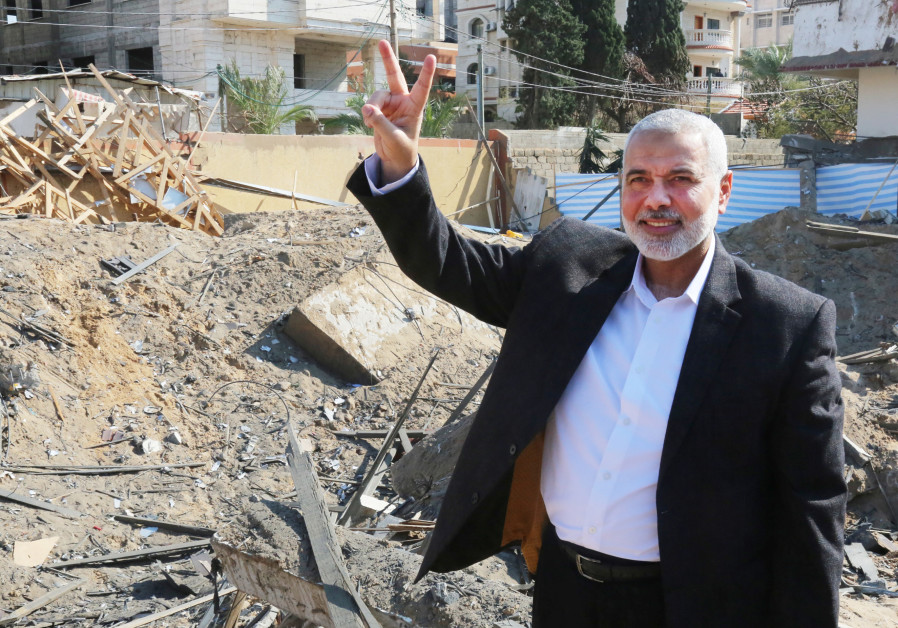Hamas waiting for Israel response to ceasefire understandings

Hamas chief Ismail Haniyeh next to his destroyed office (REUTERS/Handout). (photo credit: HANDOUT/REUTERS)
Hamas said on Sunday that it is waiting to hear from Egyptian mediators what Israel’s response is to the proposed ceasefire understandings between the Palestinian factions in the Gaza Strip and Israel.
Egyptian intelligence officials on Sunday headed from the coastal enclave to Israel to continue their discussions about ways of reaching new ceasefire understandings.
The Egyptian delegation is headed by Gen. Ahmed Abdel Khaleq, a senior official with Egypt’s General Intelligence Service.
“We’re waiting for timelines and clear programs [from Israel] for the implementation of the understandings reached between the resistance groups and the occupation,” said Hamas spokesman Abdel Latif al-Qanou.
Israel, he said, has “no choice but to commit to these understandings.”
On Sunday, Israel reopened the Kerem Shalom crossing for commercial goods and the Erez crossing for pedestrian traffic, as a sign that a shaky calm has been restored between Israel and Hamas.
The IDF closed the two crossings last week, in response to Palestinian rocket fire from Gaza that destroyed a home in central Israel.
Still, Palestinians fired five rockets at Israel overnight that fell in open territory and did not cause any damage. One rocket was fired during the day and landed in Gaza.
IDF tanks fired in response at a number of Hamas targets in the Strip.
On Sunday morning Prime Minister Benjamin Netanyahu said, “I have ordered that IDF forces remain fully deployed around the Gaza Strip. This includes tanks, artillery, ground forces and air forces.”
He added, “We are prepared for any scenario and – if need be – an extensive campaign. We will do what needs to be done for the security of Israel.
Qanou warned that Israeli failure to honor the purported understandings would lead to an escalation of the weekly protests near the Gaza-Israel border. “We will continue the pressure until the demands and rights of our people are met,” he cautioned.
Hamas and the Palestinian factions in Gaza are determined to oblige Israel to commit to the understandings, he said, adding that Israel was facing a “real test.”
According to the Hamas official, the anticipated easing of restrictions imposed on the Strip are the “fruit of the pressure” of the weekly protests, known as the Great March of Return and Breaking the Siege.
Qanou said that the purported understandings include solving the shortage of power supply, expanding the fishing zone and reopening the border crossings between Israel and the Gaza Strip, as well as several humanitarian and infrastructure projects.
The Palestinian ruling by the Fatah faction on Sunday attacked Hamas for reportedly agreeing to ceasefire understandings with Israel.
Deputy Fatah head Mahmoud al-Aloul said that by signing a “truce agreement without national consensus,” Hamas was paving the way for the implementation of US President Donald Trump’s yet-to-be-announced Middle East peace plan, known as the “Deal of the Century.”
Hamas, he said, “does not understand the priorities and its agreement [with Israel] comes at the expense of our people in a way that serves the deal of the century.”
In an interview with the PA’s Palestine TV, the senior Fatah official said that Hamas does not understand the seriousness of Trump’s upcoming plan. The plan, he claimed, is aimed at liquidating the Palestinian issue. He also claimed that Israel was working towards separating the Gaza Strip from the West Bank.
Join Jerusalem Post Premium Plus now for just $5 and upgrade your experience with an ads-free website and exclusive content. Click here>>






Comments are closed.